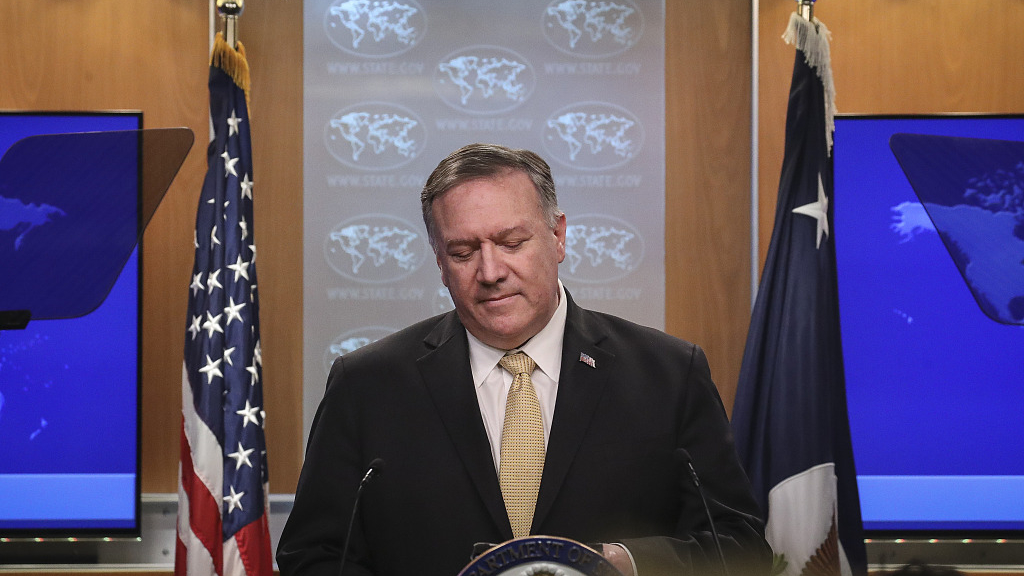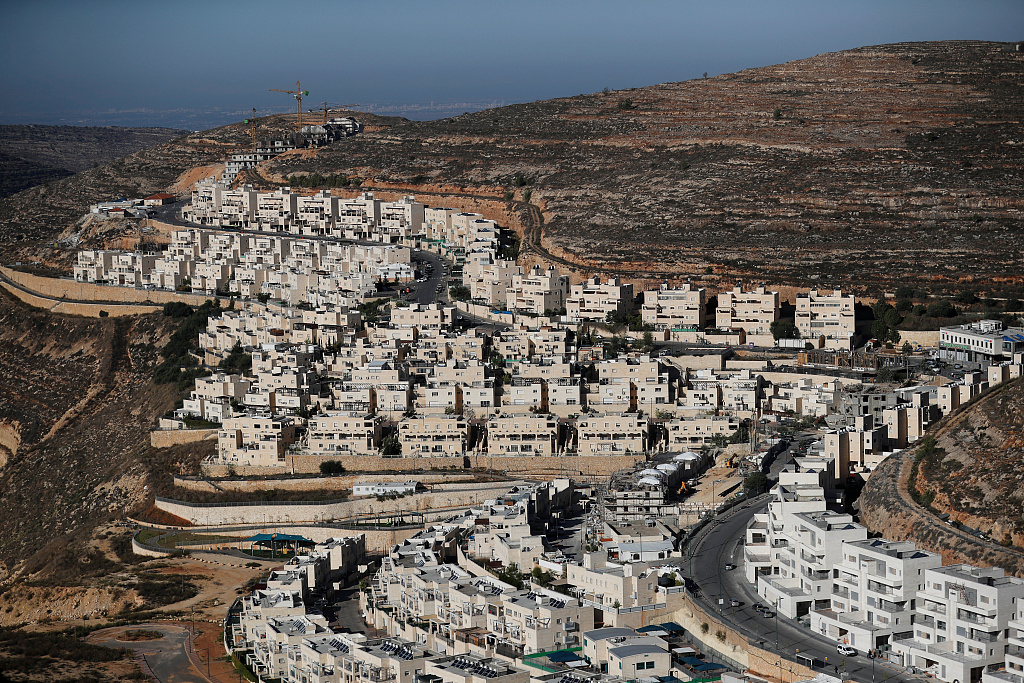
U.S. Secretary of State Mike Pompeo announced that the Trump administration does not consider Israeli settlements in the West Bank a violation of international law during a press conference in Washington, DC, November 18, 2019. /VCG Photo
U.S. Secretary of State Mike Pompeo announced that the Trump administration does not consider Israeli settlements in the West Bank a violation of international law during a press conference in Washington, DC, November 18, 2019. /VCG Photo
Editor's Note: Dr. Wang Jin is a research fellow of Charhar Institute in China and an associate Professor from Northwest University in China. The article reflects the author's opinions, and not necessarily the views of CGTN.
U.S. Secretary of State Mike Pompeo's announcement that the U.S. does not consider "the Jewish settlements in the West Bank" illegal has not only sparked widespread criticisms from the Palestinian side and the Arab states, but also meant the U.S. abandonment of its role of being a traditional major "mediator" in the Israeli-Palestinian peace process.
The announcement could be seen as a continuation of President Donald Trump's policy towards the Israel and Palestine issue. From his "recognition of Jerusalem as the capital of Israel" to his "recognition of Golan Heights as the territory of Israel", Trump based his argument of the Israeli-Palestinian issue upon the so-called "reality" rather than "morality" or "international law". For Trump and Pompeo, Israel has occupied Jerusalem, parts of West Bank and Golan Heights for decades, and it is difficult or even impossible to force Israel to give up these lands.
This issue has been extremely difficult to solve as neither Palestine nor Israel is willing to compromise.
As there are fierce competitions between different political and social groups in the Israeli society, even minor concessions given to Palestine may provoke strong opposition from other groups and factions.
Likewise, on the Palestinian side, the rivalries and competitions between different groups, especially those between the Fatah and Hamas, are so great that they have created obstacles for Palestine to make concessions to Israel. Without the concessions of Israel and Palestine, no peace could be realized in the near future.
The U.S. has played a critical role in the Middle East for decades. It chose to mediate on sensitive issues by directly involving itself in trying to solve those issues. For example, in facilitating the peace process between Israel and Egypt, the U.S. organized representatives from different parties together and tried to persuade these representatives to reach a final agreement through mutual concessions.
Washington's direct involvement into related issues means that the U.S. had to invest a lot of attention, compensations and commitments in those issues.
Under Trump's "America First" principle, the U.S. is unwilling to do so anymore including on the Israeli-Palestinian issue. The Trump administration's recent announcements could be seen as a microcosm of Trump's overall strategy in the Middle East – that is to withdraw U.S. responsibility from the region.

Construction of the Israeli settlement of Ramat Givat Zeev in the occupied-West Bank, November 19, 2019. /VCG Photo
Construction of the Israeli settlement of Ramat Givat Zeev in the occupied-West Bank, November 19, 2019. /VCG Photo
The administration intends to avoid direct involvement and to play a much less important role in the region. Since the Obama administration, the U.S. has been gradually and consistently reducing its military presence in the Middle East and reducing its role on sensitive issues.
But under Trump, this process has accelerated. Trump is the only president in the three decades after the end of the Cold War who did not organize direct negotiations between Israel and Palestine.
Given that Palestine could not accept the announcement from the Trump administration over the status of Jerusalem and the West Bank, no Palestinian official representative would attend any U.S.-organized negotiation in the future, and this would lead to a reduced ability for the U.S. to intervene.
So here comes a new problem: Who is able to replace the U.S.?
The Palestinian authority has been seeking new mediators since 2017, and Palestinian President Mahmoud Abbas has voiced his interest of cooperation with new mediators, such as the European Union, Russia and even China.
However, Abbas' efforts hasn't resulted in any major breakthrough. Both the EU and Russia lack resources or interest in getting too involved in the Middle East, especially on the Israeli-Palestinian issue. To get involved requires efforts to persuade and compensate different opposition groups, and a deep understanding and knowledge about not only relations between different political and social groups in Israel, but also the ties between different Palestinian factions. The U.S. is still the most reliable mediator on the Israeli-Palestinian issue, while no other state is capable of taking over its responsibilities just yet.
Without a new proper mediator for the issue and with the absence of U.S. involvement in the negotiation process, how Israel and Palestine can achieve the final peace, or even move towards peace, is a difficult problem.
(If you want to contribute and have specific expertise, please contact us at opinions@cgtn.com.)